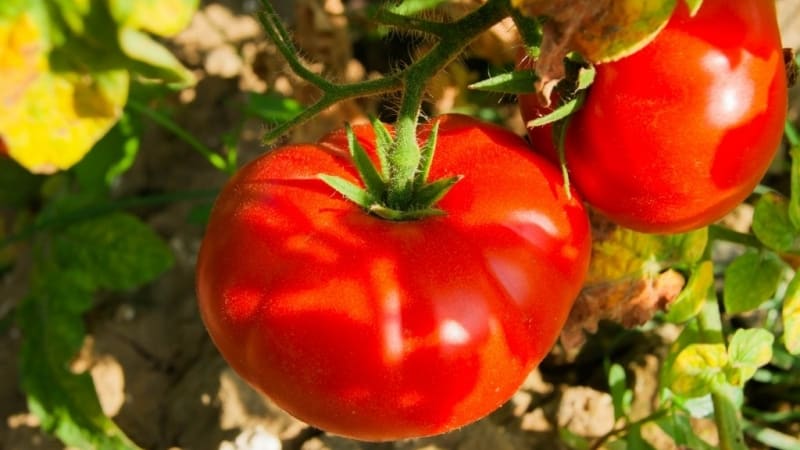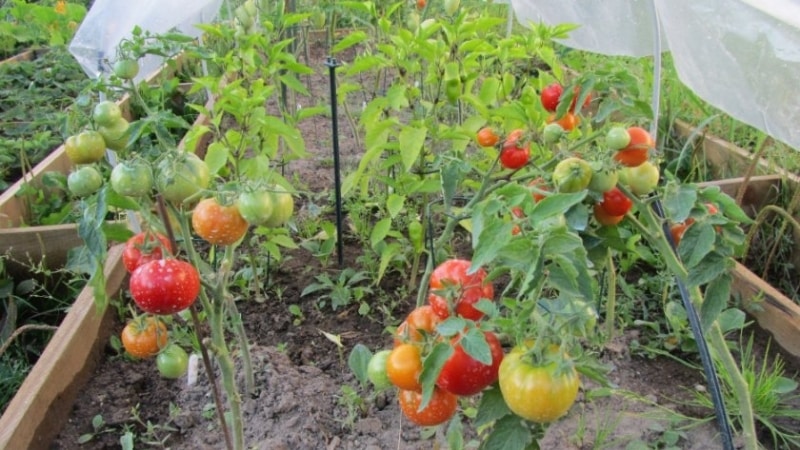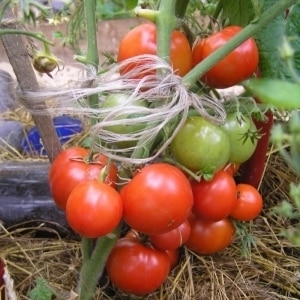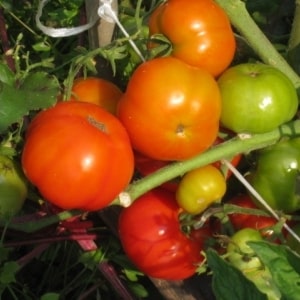Ultra-early, non-capricious, low-growing and very tasty tomato “Boni MM”: a complete overview of the variety and its cultivation
Tomatoes are one of the most popular crops all over the world. And despite all the difficulties of growing tomatoes in the climatic conditions of most regions of our country, they can be found in the beds of many gardeners.
Thanks to the efforts of breeders, many varieties and hybrids have been developed that are not only easy to care for and resistant to cold, but are also distinguished by early harvest ripening. These include the Boni MM tomato. The variety appeared on the market at the beginning of the millennium, but still enjoys stable popularity among summer residents and farmers.
General description of the variety
Boni MM is a tomato variety that is best suited for growing in the climatic conditions of Russia. Breeders managed to modify it in such a way that it is not afraid of both cold weather and heat.
Tomatoes of this variety were included in the Russian state register in 2001. They are most popular among gardeners in the former CIS countries.
Distinctive features of Boni MM
Boni MM tomato berries are the most common for this crop. They are red in color, round in shape and medium fleshy. The taste is sweet and sour with a tomato aroma. Look at the photo to see what these tomatoes look like.
Boni MM fruits are universal. They are suitable for fresh consumption, whole canning and preparation of tomato products. They are also used as an ingredient in hot dishes.
The main feature of the variety is the timing of harvest ripening. This is one of the earliest ripening fruits. Its berries turn red less than 3 months after the first shoots appear.
One cannot fail to note the short stature of the bushes of this tomato variety. They grow in height to no more than 55 cm, so the plants do not need to be formed and pinched. This makes caring for them feasible for busy summer residents and novice gardeners.
Boni MM is immune to many tomato diseases. Thanks to its early ripeness, it does not have time to become infected with late blight.
This is interesting. The Boni MM tomato does not officially belong to the balcony varieties. Despite this, it is often grown in flowerpots on loggias, producing a bountiful harvest.
Main characteristics
The Boni MM tomato has excellent characteristics for growing in our country. The description of the variety will please even novice gardeners:
| Parameter | Indicators |
| Bush type | Determinant. Standard. It does not exceed half a meter in height. The stems are not very thick, but strong. The bushes are spreading, the foliage is medium. The leaves are small, dark green. The inflorescences are simple. The first inflorescence is formed in the axil of 6-7 leaves, the next ones - after 1-2 leaves. |
| Growing method | Cold-resistant. Mainly grown in open ground. Planting in greenhouses and under film cover is possible. |
| Productivity | Average. One bush ripens 2-3 kg of berries. Just for 1 sq. m place 6-8 plants. Fruiting does not last long; Boni MM produces all the fruits in 2 weeks. |
| Fruit | Average. The weight of one fruit varies between 70-100 g. The berries are bright red inside and outside. There may be a light spot near the base. Tomatoes taste sweet and sour, with a characteristic tomato aroma. The berry contains about 5 chambers with a large number of seeds. The fruits are juicy, with a medium amount of pulp. The taste is sweet and sour. The shape is round, flattened, with slight ribbing at the base. |
| Transportability | High. The skin of Boni MM tomatoes is durable. Therefore, they are suitable for long-distance transportation and long-term storage. |
| Ripening time | Early ripening variety. The fruits ripen 80-90 days after the first shoots appear. |
| Disease resistance | Tomato is not afraid of the main diseases that affect this crop. |
Note! Judging by reviews from gardeners, the Boni MM tomato produces a better harvest when grown in open ground.
How to grow tomato seedlings
Boni MM is one of the few varieties that are grown in our country not only by seedlings. In cities with warm climates, it is possible to sow seeds directly into the beds.
Methods of growing Boni MM tomato depending on the region:
- In the northern regions, tomatoes are grown only by seedlings. In this climate, seeds are sown as early as March.
- In central Russia, it is possible to sow seeds directly into open ground. Planting material is sown at the end of May. The top of the seedlings is covered with film.
- In the southern regions, seeds are sown in open ground in early May or late April. If there is frost, the seedlings are covered with film.
You need to understand that when planting seeds in the ground, the harvest will appear much later than when growing tomatoes in seedlings. In the first case, Boni MM tomatoes will ripen in August, and in the second - in June or early July.
Preparation of planting material
Most gardeners prefer to grow Boni MM tomatoes using seedlings. Indeed, in this case, your tomatoes will appear on the table in June.
Before sowing seeds, they need to be prepared. First of all, check the expiration dates of planting material.
Gardeners say that the germination rate of Boni MM seeds is 60%. Therefore, it is recommended to keep the planting material in salted water for 30 minutes before sowing. Specimens that have sunk to the bottom are suitable for planting.
Treating the seeds will prevent plant infection. To disinfect planting material, soak it for half an hour in a weak solution of potassium permanganate or for 12 hours in a soda solution.
To speed up the germination of seeds, they are treated with a growth stimulator. To do this, they are immersed in a solution of Epin or Fitosporin. Folk remedies are also used, for example, water with honey or aloe juice.
Selection of containers and soil
Tomato Boni MM is not a rare or collectible variety. Therefore, peat tablets are rarely used for its cultivation. Seedlings of such tomatoes are cultivated in the most conventional way.
For sowing seeds, choose wide but shallow containers. Stores sell special boxes and plastic trays. They also use improvised materials, for example, plastic dishes, cut-off juice packs and bottles.
Plants are planted in separate containers. Use special or homemade pots. To make them, use plastic cups, cut-off bottles, etc.
Soil mixture for tomatoes is sold in specialized stores. They also prepare it themselves. To do this, mix peat, black soil and humus in equal parts. Instead of peat, sand and crushed coconut substrate are also used.
To enrich the soil, ash and superphosphate are added to it. If the acidity of the soil is increased, then lime is not added.
To reduce the likelihood of plant infection, you need to disinfect the soil and containers. For soil use a weak solution of potassium permanganate, and for containers a strong one.
Sowing seeds
After the preparatory work, they begin sowing the seeds. To do this, fill the container with soil so that it does not reach the edge by 3 cm.
The seeds are laid out on the soil in rows. There should be a distance of at least 2 cm between the seeds.
The seeds are sprinkled on top with a centimeter layer of soil. The soil is not compacted.
After this, the soil is moistened with a spray bottle. Use warm, settled water.
Containers with planting material are covered with film and placed in a warm place. Before the seeds germinate, they do not need light. The warmer the room is, the faster the seeds will germinate.
Seedling care
The rules for caring for tomato seedlings are the same for all varieties. The list contains the most important of them:
- Before seeds germinate, it is important to monitor the condition of the soil. If it is dry, it is moistened with a spray bottle. When mold appears on the soil, the affected layer is removed. Then the soil is watered with a light pink solution of potassium permanganate. The film is opened slightly to allow the soil to dry out a little.
- After seed germination, containers with seedlings are transferred to a well-lit place. The lack of lighting is compensated with the help of fluorescent lamps.
- The film is removed a week after the seeds germinate. Before this, the sprouts need extreme humidity, which is created by such an improvised greenhouse.
- Water the tomatoes at the root. It is important that the liquid does not fall on the greenery of the plant. Use only settled water at room temperature.
- Plant seedlings into individual pots.
- Fertilizing is applied 3 times during the entire period of growing seedlings.The first feeding is done 2 weeks after picking the plants. The next one is in another 14 days. The last time fertilizer is applied is 3-5 days before transplanting the plants to a permanent location. Use complex fertilizers.
- Before planting seedlings in a permanent place, they need to be hardened off. Within two weeks, the plants are taken outside, gradually increasing the time they spend in the fresh air.
Growing tomatoes
Tomato Boni MM is an easy-to-care variety. Therefore, even a novice gardener can cope with its cultivation.
Boni MM is grown in a greenhouse and in open ground. The second planting method is suitable even for the middle zone of our country.
Tomatoes are planted in open ground when the soil warms up. This usually happens in May.

Planting tomatoes in a permanent place
Tomato beds have been prepared since autumn. To do this, they are dug up and cleared of weeds. Organic fertilizers (manure) are added to the soil. The soil needs to be tested for acidity. If the indicators are elevated, this can be easily corrected with the help of lime.
In the spring, the beds are dug up again. They are cleaned from plant roots.
Holes are dug for tomatoes. The distance between the rows should be 30-40 cm, and between the recesses for plants 50 cm. The holes are arranged in a checkerboard pattern. Thus, for 1 sq. m fits from 6 to 9 plants.
Before transplanting, the seedlings are removed from the pots along with a lump of earth. Plant roots form in the center of the hole. After this, the holes are filled with warm water and buried.
The next watering is possible two weeks after picking the plants. At the same time, the first feeding is done.
Rules for caring for Boni MM
Tomato Boni MM is low-growing. The abundance of the harvest is ensured by its spreading nature.Therefore, this variety does not require shaping.
The bushes also do not require pinching. Only the yellowed lower leaves need to be removed. Gardeners also recommend removing ugly inflorescences.
 Since Boni MM tomato bushes are considered low-growing, they do not need to be tied up. It is important not to allow the fruits to lie on the ground. Therefore, some farmers still tie the bushes to a support.
Since Boni MM tomato bushes are considered low-growing, they do not need to be tied up. It is important not to allow the fruits to lie on the ground. Therefore, some farmers still tie the bushes to a support.
Water the tomatoes as the soil dries. Watering should be plentiful, but infrequent.
The soil must be loosened after each watering. This will prevent the formation of a crust that interferes with root air exchange.
It is important to pay enough attention to feeding plants. Over the entire season, liquid fertilizers are applied at the root 3-4 times and foliar feeding is applied 1-2 times.
To spray plants, products that include boron are used. They will speed up the formation of ovaries.
This is interesting:
Early ripening, low-growing, pink tomato variety “Pink Bush f1”.
Why every gardener should at least once grow a Bobcat tomato - the best of the low-growing ones.
Mistakes of novice gardeners
When growing tomatoes, novice gardeners often make mistakes that lead to deterioration in the quality of the crop and even death of the plants.
The list contains the most common of them:
- Watering in the heat of the moment. This will increase the chances of burns occurring on the plants. You need to moisten the soil in the morning or evening.
- Use for irrigation with ice water. This will cause the roots to rot. For irrigation, use only settled water at room temperature.
- Planting tomatoes in shaded areas of the garden. Tomatoes are a light-loving crop. With insufficient light, the yield decreases and the taste of the fruit deteriorates.
- Removing too much greenery from the bush. This will result in the harvest becoming less abundant and the tomatoes watery. Only damaged leaves from the bottom of the plant need to be removed.
Diseases and harmful insects
Tomato Boni MM is immune to major tomato diseases. Therefore, it is rarely affected by viruses and fungi. Due to its early ripeness, this tomato variety rarely gets sick. late blight.
Attention! Despite the variety’s resistance to diseases, prevention cannot be neglected. It is important to disinfect not only seeds, planting containers and soil, but also all garden tools that will interact with plants.
Compliance with the rules of care is an important stage in protecting plants from diseases. After all, waterlogged and overdried soil is the main cause of plant infection.
 It is important to protect tomatoes from harmful insects. Pests not only damage greens and tomato fruits, but also transmit pathogens of viral and fungal diseases.
It is important to protect tomatoes from harmful insects. Pests not only damage greens and tomato fruits, but also transmit pathogens of viral and fungal diseases.
To prevent the appearance of pests, the bushes are treated with infusion of celandine. When aphids appear, use a soap solution. To protect against mole crickets, eggshells are scattered near plants.
Review your tomato beds regularly. All pests are removed manually.
Features of growing in open and protected ground
Tomato Boni MM is grown mainly in open ground. It is under such conditions that this variety gives the best yield indicators.
When growing in open ground, you need to cover the plantings at night for the first two weeks. This will protect them from night frosts.
Mulching soil will retain moisture, protect roots from freezing and pathogens.Burlap or dry grass is used as mulch.
In greenhouses it is important to maintain optimal humidity. To do this, regularly ventilate the room by opening the windows.
Harvesting and application
The fruits of Boni MM tomatoes ripen at the end of June or early July. They are collected as they ripen, cut with a knife or picked by hand.
Fruiting of Boni MM does not last long. They give away the entire harvest within 2 weeks.
When harvesting tomatoes, it is important to leave the stem behind. This will prolong the storage of the crop.
The fruits are used for preservation and fresh consumption. Thanks to their strong skin and compact size, tomatoes do not crack in the jar.
Advantages and disadvantages of the variety
Advantages of Boni MM:
- unpretentiousness:
- cold resistance;
- immunity to plant diseases;
- early ripeness;
- short stature.
The disadvantages include the mediocre taste of Boni MM tomatoes. In addition, this tomato does not bear fruit for a long time.
Farmer reviews
All farmers note the unpretentiousness of the Boni MM tomato. However, not everyone likes the taste of its fruits.
Irina Metelkina, Shumerlya: “I have been growing Boni MM for more than 10 years. Of course, the tomatoes have a mediocre taste, but they ripen earlier than others. Already in June there are tomatoes on the table. Very easy to grow. Requires minimal maintenance."
Andrey Pokhvalenko, Zheleznogorsk: “I have known Boni MM the tomato for several years now. I grow it at the dacha. I water it once a week. I tie it up, because otherwise the berries lie on the ground. Otherwise, I don’t see any difficulties in care.”
Conclusion
Boni MM is one of the earliest ripening tomato varieties. This is not their only advantage. Such tomatoes are not afraid of cold weather and do not require shaping.Therefore, despite the fact that their berries are not particularly sweet, they are popular among gardeners, including beginners.